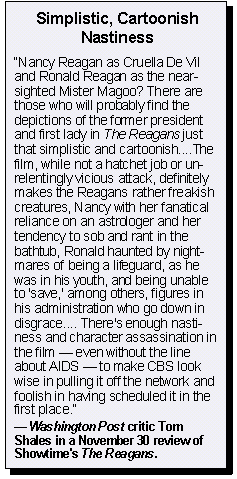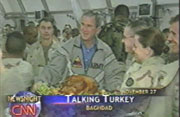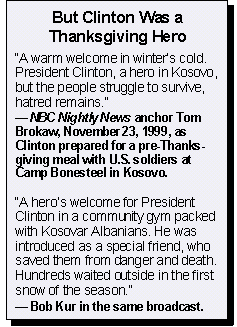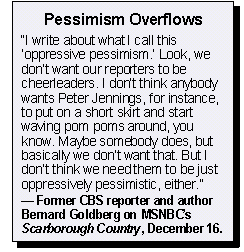 |
||||||||||||
|
||||||||||||
 |
||
|
 |
||||||||||||
|
||||||||||||
 |
||||||||||||||||||||||||||||||||||||
|
||||||||||||||||||||||||||||||||||||
|
Still Liberal, Still Biased
How Big Media Helped the Left and Hurt the Right in 2003
By Tim
Graham and Rich Noyes
January 2004
Section 6 of 6
|
November Journalists Mourn CBS’s “Censorship” of The Reagans: With their heavy emphasis on popular entertainment, the broadcast network morning shows — NBC’s Today, ABC’s Good Morning America, and CBS’s The Early Show — often bear more resemblance to Access Hollywood than the evening news. But when the New York Times revealed October 21 that the script of CBS’s then-upcoming mini-series The Reagans was loaded with cheap shots against the ailing former President and his caretaker wife, none of the morning shows found that show-biz controversy worth reporting, and none of the shows acknowledged the copious complaints from Reagan’s allies that accumulated over the next two weeks. The morning shows delayed their reporting until November 4, when CBS’s owner Viacom announced the movie was being moved to the pay cable network Showtime. As the morning hosts told the story, however, the controversy was not the mean-spirited content of the movie or the appropriateness of its timing. They seemed far more appalled by the idea that a network had agreed with the complaints of Ronald Reagan’s family, friends, and supporters. But this liberal spin was undermined when the movie finally aired on Showtime on November 30. Just as conservatives had feared, it denigrated Ronald Reagan as a vapid dolt who was manipulated by his wife and scheming advisors, while Nancy was portrayed as mean and neurotic. The film gave short shrift to President Reagan’s many accomplishments, while the Iran-contra scandal and AIDS epidemic got top billing. “Upon seeing the finished product, I felt the movie was quite biased against the Reagans,” CBS Chairman Les Moonves, a liberal, told a Yale University audience on November 5. In the immediate aftermath of Viacom’s decision, disgruntled journalists portrayed it as a free-speech controversy, not a matter of political bias and poor taste. On ABC’s Good Morning America November 5, co-host Charles Gibson asked Ronald Reagan’s son, Michael: “Your dad comes, came from the Hollywood community, and he knows what the issues of artistic freedom are. How do you think he’d react?” Recalling past movies about Presidents, Gibson inquired: “Is a different standard being applied?” Then, referring to a widely-reported quote from the original script that wrongly implied that Reagan was a hateful homophobe, Gibson rationalized: “A lot of people feel, for instance, that your dad was slow to recognize the AIDS crisis, that it had festered for quite a period of time before he addressed it. So if you fictionalize that, is that necessarily wrong?”
Smith also gave air time to some whining from Barbra Streisand, as he asked Syracuse University professor Robert Thompson: “Barbra Streisand said today marks a sad day for artistic freedom. Do you think CBS allowed themselves to be bullied by this?” The drumbeat continued the next day on Today, as Katie Couric framed the debate this way: “Is Ronald Reagan untouchable?” “While he was in office, he was known as the Teflon President, Ronald Reagan,” Couric pronounced at the start of the program. “Now that CBS has pulled a controversial miniseries about him, some are wondering if the former President is totally off-limits to criticism these days.” In a later interview, she challenged former Reagan aide Ed Rollins: “Does it bother you at all, that, that one group in America or many Americans...can basically exert this kind of political pressure and create an environment where, perhaps, free speech is not exercised?” The anger that The Reagans had been taken off CBS’s schedule was not confined to morning television. On CNBC November 4, future NBC Nightly News anchor Brian Williams blamed “mostly Republican pressure groups” for the movie’s cancellation, asking former Reagan aide Mike Deaver whether CBS’s decision was “dangerous.” He asked New York magazine’s media critic Michael Wolff, “Do you believe what has happened here with this mini-series on CBS amounts to extortion?” “Certainly capitulation,” Wolff agreed, warning: “There is no group as well-organized as the right wing in America at this point in time.” A November 5 New York Times editorial accused Reagan supporters of creating a “Soviet-style chill.” The Times, with a sudden concern for communist-like oppression, worried, “His supporters credit him with forcing down the Iron Curtain, so it is odd that some of them have helped create the Soviet-style chill embedded in the idea that we, as a nation, will not allow critical portrayals of one of our own recent leaders.” Philadelphia Daily News TV critic Ellen Gray voiced her disgust to the Washington Post’s Lisa de Moraes in a quote that appeared November 4. Referring to CBS’s May mini-series on the Nazi dictator who killed millions, Gray grumbled, “If Hitler had more friends, CBS wouldn’t have aired [its Hitler mini-series] either.” “Gutless CBS,” read the headline over an online piece by Newsweek’s Jonathan Alter who complained: “It’s a big victory for the ‘Elephant Echo Chamber,’ the unholy trinity of conservative talk radio, conservative Internet sites and the Republican National Committee.” USA Today’s Robert Bianco argued: “If nothing else, this act of creative sabotage should put to rest the idea that the media are liberal.” But if the media were not liberal, CBS would never have produced such a derogatory biography of Ronald Reagan. It’s more logical to argue that CBS’s cancellation is the exception which proves the rule. Indeed, the Chicago Tribune’s Vincent J. Schodolski, John Cook and Frank James reported the day after the decision: “A CBS executive who spoke on the condition of anonymity said the liberal political views of most CBS executives blinded them to the possibility that Reagan supporters might latch on to the movie as a political issue. ‘I don’t think most people saw it coming,’ the executive said. ‘It’s part of the bubble that we live in.’” A bubble that apparently includes Bianco, Alter, the New York Times and a host of network journalists. When the re-edited version of the movie finally aired on Showtime, its anti-Reagan agenda was evident to all but the most ardent leftists. (See box.) Showtime hosted a panel discussion about the movie on December 1, during which two former liberal reporters, Marvin Kalb and Lou Cannon, denounced the unfair and inaccurate portrayal. Cannon, a former Washington Post reporter Lou Cannon, who penned several biographies of Ronald Reagan, argued that “it’s hard to imagine a cartoon that could be that bad....Remember the famous debate where Lloyd Bentsen says to Dan Quayle, you know, ‘I know John F. Kennedy and you’re no John F. Kennedy’? Well, I do know Ronald Reagan. This isn’t Ronald Reagan.”
By Friday morning, the three network morning shows were sharpening their knives for National Security Adviser Condoleezza Rice, demanding to know about the trip’s political motivations and implications. They began with how the secret trip was accomplished, but then turned tougher. ABC’s Charles Gibson insisted: “Dr. Rice, there’s obviously great symbolism to this trip. Because it is important for a Commander-in-Chief to come and see his troops. But so is there symbolism that the things are so unstable that he had to sneak in, in darkness, that, that he never left the airport, that could only stay two and a half hours.” Gibson followed up: “I guess I’m asking, isn’t there symbolism in the fact that it points up that not much has changed in eight months?”
Over on NBC’s Today, Matt Lauer suggested dark motives: “Let’s talk about some criticism that’s been leveled at President Bush as of late, Dr. Rice. And that is that because he did not attend any of the funerals of the fallen soldiers in Iraq, some family members felt he was not showing compassion or a connection to the suffering that they have felt as a result of this war. Was this trip an effort to blunt that criticism?” In the week that followed, some network reporters tried to turn the trip into a controversial moment. Presidential press secretary Scott McClellan was hounded about inconsistencies in the early versions of how the trip happened and which planes had made contact with Air Force One. NBC’s Norah O’Donnell suggested “Do you think, though, that this third revision of this story now, takes some shine off the President’s surprise visit to the troops?” CBS’s John Roberts added: “What are the legalities of filing a fraudulent flight plan?” As with May’s “Mission Accomplished” speech, CNN's Aaron Brown was one of the most enthusiastic pseudo-scandal manufacturers. When Washington Post reporter Mike Allen wrote that the turkey that President Bush held up for cameras was a roasted display turkey that was not eaten, Brown invited Allen to discuss the less-than-Earth-shaking matter on CNN. Leading off two segments lasting eight minutes, Brown joked: “The troops didn’t get a taste of it, and so tonight we ask: does this constitute, get ready, Turkeygate?” Brown pressed former Bush aide Mary Matalin: “Do you worry that, when the White House at one point said, well, when the President flew to the aircraft carrier, he had to fly in a jet, and then later had to retract that, that it raises questions about the veracity of the White House itself, not just the President?”
December Saddam Captured, But Reporters Still Gloomy: Americans woke up on Sunday, December 14 to the shocking news that Saddam Hussein had been captured alive, found in a tiny “spider hole” with a few candy bars. Iraqis waved red flags in the streets and celebrated. It was a great moment of achievement for the military, but not a great moment for the media. In their perpetual attempt to see only problems, even in the midst of a dramatic solution, ABC News quickly identified the headaches to come. At 8:10 in the morning, little more than an hour after Saddam’s capture was announced, ABC’s Terry Moran was finding the dark clouds, with no silver linings:
This talk of the U.S. relationship with Iraq in the 1980s “spilling out” is a very odd formulation, since ABC — and the other networks — worked very hard in 1992 to blame the Reagan and Bush administrations for building Saddam up, leading to the first Gulf War. On October 28, 1992, six days before the presidential election, ABC Nightline host Ted Koppel declared that 18 months of ABC’s searching had revealed a series of “legal and illegal technology transfers” to Iraq. Koppel began by underlining the massive legwork the major media had done to expose the Bush administration: “It’s a story that Nightline has revisited repeatedly over the past year and a half. The Los Angeles Times reported today that they have done more than 100 stories on the subject, over 90,000 words. This week’s New Yorker did a massive report. New York Times columnist William Safire has been relentless in pursuing the issue.” Nightline aired at least eight shows on the Reagan-Bush tilt toward Iraq. ABC was quite involved in “spilling” on this story. Stuart Taylor, a legal analyst now with Newsweek, denounced these stories in 1994, finding “there wasn’t much beef in this gigantic scandalburger...This edifice of innuendo was erected on a foundation of factual errors and distortions that spread like a contagion.” But the oddest denial of the capture’s meaning came on ABC’s prime-time special on Saddam’s capture. In Baghdad, reporter Martin Seemungal relayed how many Iraqis were joyful, but others were muted: “They feel cheated. They’re essentially saying that it would have been much better, they would have been happier to see him fight because it would have justified the fear that they had for him for these so many years.” Without explaining his personal contact with Iraqis during the day, Jennings asserted: “On the other hand Martin, as people have suggested to us today, there’s not a good deal for Iraqis to be happy about at the moment. Life is still very chaotic, beset by violence in many cases, huge shortages. In some respects, Iraqis keep telling us life is not as stable for them as it was when Saddam Hussein was in power. Is that a factor today?” To Jennings, “stability” under a tyrant who tortured and killed opponents was more desirable than the hard work of overcoming him. Another strange moment came that night on CBS, when 60 Minutes star Lesley Stahl interviewed Defense Secretary Donald Rumsfeld. Stahl worried about the hospitality Saddam would receive: “Let me raise the whole question, for lack of a better term, torture. Let’s say he’s not forthcoming. Would we deprive him of sleep, would we make it very cold where he is, or very hot? Are there any restrictions on the way we treat him to get him to cooperate more than he has been?” When Rumsfeld insisted we would we follow the Geneva Conventions, that wasn’t good enough for Stahl who pressed: “Sleep deprivation, that kind of thing. You’re ruling it completely out, is that what you’re telling us?” The next morning, Reuters correspondent Joseph Logan opened a dispatch from Baghdad: “Joy at the capture of Saddam Hussein gave way to resentment toward Washington Monday as Iraqis confronted afresh the bloodshed, shortages and soaring prices of life under U.S. occupation.” Talking Heads Celebrate “Reform” but Demand Even More: In covering the Supreme Court’s December 10 ruling upholding the McCain-Feingold campaign finance “reform” law, network stories matched the liberal agenda of campaign regulation advocates. Instead of showing any concern for the diminution of free speech rights, the networks presumed there’s too much money in political campaigns, and ignored how the media remain exempt from the speech restrictions which regulate everyone else. Indicating how some journalists may wish for still more restraints on other people’s free speech, a number of reporters rued how “special interest money” will still be a factor in campaigns despite the law and court ruling. ABC and CBS failed to even mention the limits on political ads 60 days before an election, a limitation which protects incumbents from speech they don’t like. While CBS, NBC and CNN at least cited dissenting Justice Scalia’s free speech concerns, ABC didn’t mention the views of the minority. Instead, World News Tonight held itself to a short item read by anchor Peter Jennings, who approvingly cited the Court’s warning: “The majority warned that the law is not a cure all, saying that ‘money, like water will always find an outlet.’ And ABC’s John Cochran reports the big money is already flowing and outside groups are preparing to spend large amounts of money to influence the next campaign.” The spin was the same on CBS. “The Supreme Court rules on campaign finance reform. The controversial law stands, but we’ll show you the loophole where big special interest money can still get through,” Dan Rather warned in teasing the December 10 CBS Evening News. Wyatt Andrews warned: “Anyone who thinks this ruling ends soft money in politics is wrong. Political groups called 527s, tax-exempt groups not aligned with the political parties, are already organizing in droves to, guess what, raise unlimited soft money, mostly for ads. One left-leaning 527, MoveOn.org, is using soft money for this anti-Bush ad in four states. And this....anti-Dean ad is sponsored by a right-leaning 527, the Club for Growth, again with soft money. Despite the Court’s ruling, unlimited cash will still flow into politics. It just won’t be channeled through the parties.” NBC’s Tom Brokaw opened his December 10 newscast by making the case for the so-called “reform” bill that five Justices had approved. “Many worry,” Brokaw argued, that American politics “has been corrupted by the massive amounts of money pouring into campaigns, the single-minded pursuit of money by politicians and the advantages all of that money brings to the wealthy and the special interests, especially so-called soft money which was unregulated.” Naturally, Brokaw did not worry about the “special interests” NBC News is able to promote or denigrate, but how the rules benefit President Bush did worry him: “This ruling doesn’t remove the place of money from campaigns — far from it. In fact, many believe it will only help President Bush who has the built-in advantage of the White House for fundraising and the sky’s the limit because he chose not to accept the restrictions that come with federal matching funds for the campaign.” On CNN’s Inside Politics, anchor Judy Woodruff celebrated with Senator Russ Feingold and then pressed him on whether McCain-Feingold’s restrictions on free speech were stringent enough: “Already you have these independent third-party groups, so-called 527 committees, that are out there raising money, putting money into this presidential campaign, both on the left and on the right, in effect, you know, making what the court decided today, you could argue, meaningless because money is finding its way back into these campaigns in an unregulated way.” Over the past several presidential campaigns, network reporters in particular have sought to counter candidate advertising, attempting to negate its effect with “Ad Watches” and other editorial devices. At the same time, journalists became open cheerleaders for the types of campaign regulation embraced by McCain-Feingold, which restricts candidates, political parties, and other interest groups but not the media. Reporters like Woodruff regularly describe the freedom to participate in the political process by giving money, forming groups and sponsoring their own advertising as some kind of “loophole” begging to be closed by new laws. Perhaps journalists’ itch to “reform” the political process won’t be completely satisfied until the media elite again dominate the political debate, as they did before conservative media watchdogs like the Media Research Center documented how their supposedly objective “news” was just so much liberal bias.
The Media Research Center For an interview with an MRC Spokesman, please contact Katie Wright at (703) 683-5004
Home | News Division
| Bozell Columns | CyberAlerts |
||||||||||||





 That same day on the Early
Show, CBS’s Harry Smith mimicked using a TV remote control as he suggested to Michael Reagan that those who complained were just thin-skinned: “Why the vehemence, why the anger? I mean, we live in a, hang on, we live in this multi-channel, digital universe of hundreds and hundreds of choices. All you have to do is go like this, if you don’t like it, you just go like that.”
That same day on the Early
Show, CBS’s Harry Smith mimicked using a TV remote control as he suggested to Michael Reagan that those who complained were just thin-skinned: “Why the vehemence, why the anger? I mean, we live in a, hang on, we live in this multi-channel, digital universe of hundreds and hundreds of choices. All you have to do is go like this, if you don’t like it, you just go like that.” "Turkeygate" -
Reporters Mar Bush's Baghdad Trip: Faced with
a traditionally slow news day on Thanksgiving, President Bush surprised everyone but the Secret Service and a small press pool by showing up in Baghdad to celebrate the holiday with the troops in Iraq. Like Bush’s plane landing in May, the immediate reaction was electric and positive, which the media elite then felt compelled to drown out with Democratic attack lines.
"Turkeygate" -
Reporters Mar Bush's Baghdad Trip: Faced with
a traditionally slow news day on Thanksgiving, President Bush surprised everyone but the Secret Service and a small press pool by showing up in Baghdad to celebrate the holiday with the troops in Iraq. Like Bush’s plane landing in May, the immediate reaction was electric and positive, which the media elite then felt compelled to drown out with Democratic attack lines. CBS’s Harry Smith stated as fact that there was no connection between 9/11 and Saddam Hussein, and
implied there are no terrorists in the world who want to kill Americans other than the ones who attacked on 9/11, as he challenged Rice: “Certainly the soldiers that were interviewed said it was a major morale boost, to have the President, have the Commander-in-Chief there. But you brought something up, an interesting point, why they’re there. The President said during his remarks to the troops, he said: ‘You’re defeating terrorists in Iraq so we don’t have to face them in our own country.’ Now, there’s no connection between Iraq and 9/11. Why does the President persist in tying those two together?”
CBS’s Harry Smith stated as fact that there was no connection between 9/11 and Saddam Hussein, and
implied there are no terrorists in the world who want to kill Americans other than the ones who attacked on 9/11, as he challenged Rice: “Certainly the soldiers that were interviewed said it was a major morale boost, to have the President, have the Commander-in-Chief there. But you brought something up, an interesting point, why they’re there. The President said during his remarks to the troops, he said: ‘You’re defeating terrorists in Iraq so we don’t have to face them in our own country.’ Now, there’s no connection between Iraq and 9/11. Why does the President persist in tying those two together?” “What happens to Saddam Hussein now becomes an international political problem for this administration in two ways: First, Saddam Hussein was at the heart of Iraqi politics for 30 years really. He was President since 1979, but really in power before then. And for about 15 of those years the United States had an interesting relationship, to say the least, with the Iraqi government. Secretary Rumsfeld was over in Baghdad meeting with Saddam Hussein years ago. There are allegations that the United States provided weapons to Saddam Hussein’s regime during the Iran-Iraq war. And all that could spill out in a big show trial.” Moran’s line of impending U.S. embarrassment was repeated on ABC’s
Good Morning America and Nightline.
“What happens to Saddam Hussein now becomes an international political problem for this administration in two ways: First, Saddam Hussein was at the heart of Iraqi politics for 30 years really. He was President since 1979, but really in power before then. And for about 15 of those years the United States had an interesting relationship, to say the least, with the Iraqi government. Secretary Rumsfeld was over in Baghdad meeting with Saddam Hussein years ago. There are allegations that the United States provided weapons to Saddam Hussein’s regime during the Iran-Iraq war. And all that could spill out in a big show trial.” Moran’s line of impending U.S. embarrassment was repeated on ABC’s
Good Morning America and Nightline.